Columna est un film roumain de genre Drame réalisé par Mircea Drăgan avec Richard Johnson
Columna (1968)
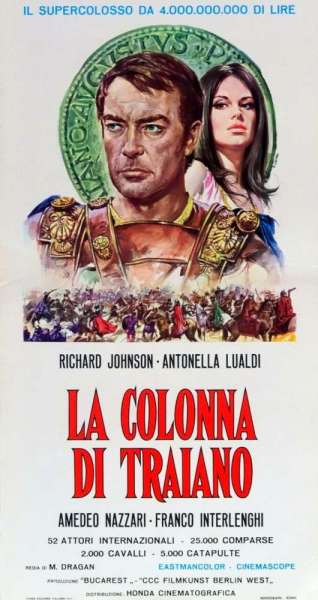
Si vous aimez ce film, faites-le savoir !
The Column (Romanian: Columna) is a 1968 Romanian historical film directed by Mircea Drăgan. The film was selected as the Romanian entry for the Best Foreign Language Film at the 41st Academy Awards, but was not accepted as a nominee.
The action starts near the end of Trajan's Dacian Wars (106 AD), when south western Dacia was transformed into a Roman province: Roman Dacia. It covers the years after the war, including the beginnings of the Romanization and Romanian ethnogenesis, the construction of Ulpia Traiana Sarmizegetusa, resistance of the Free Dacians and first barbarian invasions.
Synopsis
As the Romans under Trajan take the Dacian capital Sarmizegetusa, the Dacian king Decebalus and his closest followers are forced to retreat. Trajan takes command of the city and orders one of his officers, Tiberius, to pursue the defeated king. In a cave, Decebalus broods on his defeat, and tells his devoted supporter Gerula that the Dacian people must continue to resist. Tiberius and his men catch up with Decebalus and Gerula. Decebalus kills himself to avoid capture. To Gerula's horror, Tiberius chops off Decebalus' head and right hand as trophies to take back to Trajan. While they are returning to the Roman camp Gerula escapes. He gathers together a group of Dacians and takes them to a part of the land not yet under Roman control.Acteurs
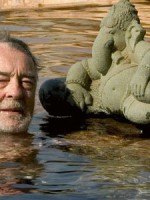
Richard Johnson
(comandantul roman Tiberius)

Antonella Lualdi
(Andrada)

Ilarion Ciobanu
(Gerula, căpetenie dacă)

Gino Buzzanca
(împăratul Traian)

Florin Piersic
(Sabinus)
Commentaires
Postez un commentaire :
Suggestions de films similaires à Columna
Il y a 164 films ayant les mêmes acteurs, 4 films avec le même réalisateur, 62909 ayant les mêmes genres cinématographiques (dont 4070 ayant exactement les mêmes 2 genres que Columna), 1383 films qui ont les mêmes thèmes, pour avoir au final 70 suggestions de films similaires.Si vous avez aimé Columna, vous aimerez sûrement les films similaires suivants :

Antony and Cleopatra (1975)
, 2h41Réalisé par Trevor Nunn
Origine Royaume-uni
Genres Drame, Historique, Romance
Thèmes Afrique post-coloniale, Politique, Adaptation d'une pièce de théâtre, Adaptation d'une pièce de théâtre de William Shakespeare, Royauté
Acteurs Richard Johnson, Janet Suzman, William Thomas, Patrick Stewart, Corin Redgrave, Philip Locke
Note67%






Khartoum (1966)
, 2h14Réalisé par Basil Dearden
Origine Royaume-uni
Genres Drame, Guerre, Action, Aventure, Historique
Thèmes Afrique post-coloniale, Le terrorisme, Politique
Acteurs Laurence Olivier, Charlton Heston, Richard Johnson, Ralph Richardson, Alexander Knox, Michael Hordern
Note67%





Le récit du film est centré sur le siège de Khartoum, en 1885, durant la guerre des Mahdistes au Soudan : un chef musulman, le Mahdi (l'Attendu) lance une insurrection contre l'occupant égyptien et son allié britannique. Le Premier Ministre britannique Gladstone envoie le général Gordon, surnommé Gordon Pacha, à Khartoum pour assurer la protection des ressortissants britanniques encore présents.

Les Guerriers (1967)
, 1h50Réalisé par Sergiu Nicolaescu
Origine Roumanie
Genres Drame, Guerre, Historique
Thèmes Afrique post-coloniale
Acteurs Pierre Brice, Amza Pellea, Marie-Josée Nat, Georges Marchal, Mircea Albulescu, Sergiu Nicolaescu
Note75%





In a pre-credit sequence, a massive Roman army arrives at the gates of a Dacian town. The Roman envoy asks them to open the gates, promising them life and liberty. The guard on watch asks who is making this demand, and gets the reply "the masters of the world". He responds "You will be when we will die".

Néfertiti, reine du Nil (1961)
, 1h46Réalisé par Fernando Cerchio
Origine Italie
Genres Drame, Biographie, Historique, Péplum
Thèmes Afrique post-coloniale
Acteurs Jeanne Crain, Vincent Price, Edmund Purdom, Gino Buzzanca, Liana Orfei, Alberto Farnese
Note53%





La vestale Tanit, fille du grand prêtre Benakon de Thèbes, a rejoint son amant Tumos, un sculpteur. Découverte par les hommes de son père, Tanit est ramenée chez Benakon. Il lui promet son pardon si elle épouse le prince Aménophis…

Lupeni 29 (1963)
Réalisé par Mircea Drăgan
Origine Roumanie
Genres Drame
Acteurs Colea Răutu, Ilarion Ciobanu, Draga Olteanu Matei
Note61%





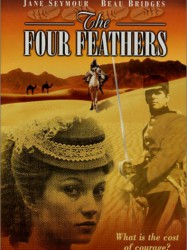
The Four Feathers (1978)
, 1h40Réalisé par Don Sharp
Origine Royaume-uni
Genres Drame, Guerre, Aventure
Thèmes Afrique post-coloniale, Politique
Acteurs Beau Bridges, Jane Seymour, Robert Powell, Simon Ward, Harry Andrews, Richard Johnson
Note63%





Lieutenant Harry Faversham (Beau Bridges) is the latest scion of a prominent military family. A deeply sensitive boy, he is much traumatised by the early death of his kind-hearted mother. Though he never wants to be a soldier, he feels obliged to join the army. Though no coward (as he will later show), he has no interest in an army career. Having met and become engaged to Ethne, he decides to resign his commission. The fact that war in the Sudan is coming is irrelevant to this decision. During their engagement ball on the final day of his army career, Faversham receives telegrammes summoning him and three of his brother officers (Durrance, Willoughby and Trench) back to the regiment prior to being sent to the Sudan. As determined as ever to leave the army, Faversham burns the telegrammes so that he can pretend not to have been summoned back to the regiment before his commission expires. Willoughby sees him burning papers and notices that he is embarrassed to have been taken by surprise in doing so. On later realising that Faversham was burning the telegrammes from the army, Willoughby assumes that Faversham has done so because he is afraid of going to the Sudan. Durrance, Willoughby and Trench then send Faversham three white feathers, betokening cowardice, and turn their backs on him. When Faversham tries to explain to Eithne what has happened, she also reaches the same mistaken conclusion and gives him a fourth white feather. Following his regiment's deployment, Faversham realizes he has made a grave mistake and, having toyed with suicide, finally resolves to redeem his honour.
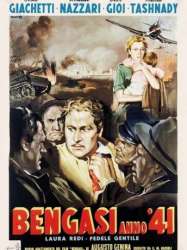
Bengasi (1942)
, 1h30Réalisé par Augusto Genina, Primo Zeglio
Origine Italie
Genres Drame, Guerre
Thèmes Afrique post-coloniale, Politique, Le désert, Guerre du désert
Acteurs Fosco Giachetti, Maria von Tasnady, Gino Buzzanca, Vivi Gioi, Gabriele Ferzetti, Carlo Tamberlani
Note67%





L'action se déroule pendant la Seconde Guerre mondiale, quand la ville de Benghazi en Libye sous contrôle italien est occupée par des forces britanniques. Les habitants italiens de Benghazi résistent aux Britanniques et essaient de découvrir leurs plans militaires. Un homme, le capitaine Enrico Berti, feint de collaborer avec les Britanniques, mais espionne en fait pour les services secrets italiens. Le film se termine avec la ville reprise par les troupes italiennes et leurs alliés allemands nazis.

13 Hours (2016)
, 2h24Réalisé par Michael Bay
Origine Etats-Unis
Genres Drame, Guerre, Thriller, Action, Historique
Thèmes Afrique post-coloniale, Les attentats du 11 septembre 2001, La mer, Le terrorisme, Transport, Film catastrophe, Forces armées des États-Unis, Détournement d'avion
Acteurs James Badge Dale, John Krasinski, Toby Stephens, Pablo Schreiber, Max Martini, David Denman
Note72%





Le 11 septembre 2012, soit 11 ans jour pour jour après les attentats du 11 septembre 2001, des terroristes attaquent la mission diplomatique des États-Unis et une base de la CIA à Benghazi, en Libye. Quatre Américains sont tués, dont l'ambassadeur des États-Unis en Libye J. Christopher Stevens. Cette attaque est repoussée par six agents de sécurité, Jack Silva, Tyrone « Rone » Woods, Mark « Oz » Geist, Kris « Tanto » Paronto, Boon et John « Tig » Tiegen.
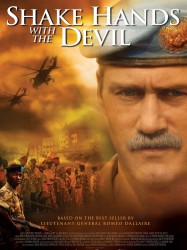
J'ai serré la main du diable (2007)
, 1h53Réalisé par Roger Spottiswoode
Origine Canada
Genres Drame, Historique
Thèmes Afrique post-coloniale, Politique, Politique
Acteurs Roy Dupuis, Deborah Kara Unger, James Gallanders, Jean-Hugues Anglade, Michel Mongeau, Tom McCamus
Note75%





Le général Roméo Dallaire (Roy Dupuis) est envoyé en octobre 1993 comme commandant de la Force de maintien de la paix des Nations unies des l'Organisation des nations unies au Rwanda (MINUAR) afin, entre autres, d’aider ce pays à maintenir la fragile paix entre les forces du Front patriotique rwandais (FPR) et les Forces armées rwandaises (FAR). Cette force internationale ne comporte que quelques centaines d'hommes, principalement canadiens, belges, ghanéens et bangladais. À la suite de la mort du président du Rwanda, Juvénal Habyarimana, dont l'avion s'écrase dans la nuit du 6 au 7 avril 1994, les branches extrémistes gouvernementales Hutu procèdent, à l’aide notamment du groupuscule Interahamwe (« Ceux qui attaquent ensemble »), à l’élimination systématique des Tutsi et des Hutu modérés du Rwanda.

Boadicea (1927)
Réalisé par Sinclair Hill
Origine Royaume-uni
Genres Drame, Guerre, Biographie, Historique
Thèmes Afrique post-coloniale
Acteurs Lillian Hall-Davis, Clifford McLaglen, Clifford Heatherley, Wally Patch
Note66%





 Connexion
Connexion